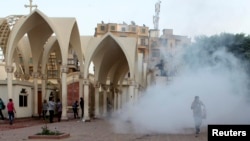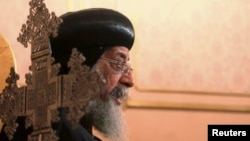Egypt’s military-appointed leaders are not doing enough to protect Coptic Christian churches from a surge of attacks unleashed by Islamists since the government crackdown on protest camps set up by the Muslim Brotherhood, according to foreign politicians and analysts.
They warn that the anti-Christian violence is being encouraged by top Islamists preachers overseas, including Sheikh Yusif al-Qaradawi, considered the spiritual father of the Muslim Brotherhood. Qaradawi has urged retaliation against the Copts for their backing of the military’s ousting of president Mohamed Morsi.
Churches and Christian institutions as well as property owned by Copts have come under attack since the crackdown on supporters of Mohamed Morsi left hundreds dead, say Coptic leaders. Bishop Anba Suriel, the bishop for the Coptic Orthodox Church in Melbourne in Australia, wrote on his Twitter blog Wednesday there were “over 20 separate attacks on churches and Christian institutions all over Egypt.”
“These attacks on the Copts are unprecedented in the modern era,” said Suriel, who complained on his Twitter feed that the international media is failing to report adequately on the attacks.
Egypt’s state news agency has reported assaults on three churches in central Egypt, including the destruction of the Mar Gergiss church in Sohag on the west bank of the Nile. The city of Sohag has a large Coptic community.
Christians a sizeable minority
Christians make up about 10 percent of Egypt's population, or well over eight million people. Hard-line Islamists blame Egypt’s Coptic Christian community for helping to oust Morsi, a prominent leader of the Muslim Brotherhood. The Coptic Orthodox Church is one of Christianity’s oldest, founded in Alexandria around 50 AD.
On Wednesday, dozens of Morsi supporters stormed the 4th century Virgin Mary Monastery in the Upper Egypt village of Minya, breaking its main gate and firebombing the building, according to monastery officials. The attackers, who carried gasoline bombs, chanted slogans in support of Morsi.
Former Canadian justice minister Irwin Cotler, a human rights campaigner who co-authored a report on threats against the Coptic Church, has urged Egypt’s army to “provide more protection to the Copts.” He warns the anti-Christian violence by hardline Islamists is taking place within “a general culture of impunity.”
The independent Mideast Christian News service has reported that several monasteries, churches, a Bible Society headquarters and Christian schools - Roman Catholic, Orthodox and Coptic - were attacked in Cairo, Upper Egypt, Sinai and the Suez, during a 48-hour period.
State Department monitoring
“We’ve obviously seen these reports and would express our deep concern about them,” Marie Harf, a U.S. State Department spokeswoman, told reporters. “Clearly, any reports of violence we’re concerned about, and when it involves a religious institution, we are concerned about that as well.”
Egypt’s Copts have faced increasing violence over the years, but since the Arab Spring ouster of president Hosni Mubarak, there have been more incidents of attacks and threats against the Coptic community.
In January of 2011, a bomb attack on a Coptic Church in Alexandria left more than 20 people dead and more than 100 wounded. Last October, a Coptic protest over anti-Christian violence came under attack from the Egyptian military. Twenty-five people were killed and hundreds injured.
Violence increasing since Morsi ouster
But since President Morsi was removed from power by the military in early July, the violence has increased in frequency. The Coptic pope, Tawadros II, has received death threats and several Christians have been killed.
Last month, four Coptic Christian men were killed by residents in Luxor on the Nile and scores of Christian homes torched and looted, according to the human rights group Amnesty International. The group said security forces were at the scene but failed to stop the violence. Amnesty urged the new Egyptian authorities “to break the pattern of failure to act and cover-up which has characterized successive governments’ responses to sectarian violence.”
Jihadists have also been adding fuel to the sectarian fire, say analysts.
Earlier this month, al-Qaida leader Ayman al-Zawahiri, said Coptic Pope Tawadros II wanted to establish a Coptic state in Egypt. And Sheikh Yusif al-Qaradawi, the Muslim Brotherhood spiritual leader, posted an online video saying that Christians “were recruited [by Egypt’s military] to kill innocent Muslims.”
Christian leaders are worried that Egypt’s new rulers will continue to be more focused on dealing with challenges to their own power than protecting the people and churches of a religious minority.
They warn that the anti-Christian violence is being encouraged by top Islamists preachers overseas, including Sheikh Yusif al-Qaradawi, considered the spiritual father of the Muslim Brotherhood. Qaradawi has urged retaliation against the Copts for their backing of the military’s ousting of president Mohamed Morsi.
Churches and Christian institutions as well as property owned by Copts have come under attack since the crackdown on supporters of Mohamed Morsi left hundreds dead, say Coptic leaders. Bishop Anba Suriel, the bishop for the Coptic Orthodox Church in Melbourne in Australia, wrote on his Twitter blog Wednesday there were “over 20 separate attacks on churches and Christian institutions all over Egypt.”
“These attacks on the Copts are unprecedented in the modern era,” said Suriel, who complained on his Twitter feed that the international media is failing to report adequately on the attacks.
Egypt’s state news agency has reported assaults on three churches in central Egypt, including the destruction of the Mar Gergiss church in Sohag on the west bank of the Nile. The city of Sohag has a large Coptic community.
Christians a sizeable minority
Christians make up about 10 percent of Egypt's population, or well over eight million people. Hard-line Islamists blame Egypt’s Coptic Christian community for helping to oust Morsi, a prominent leader of the Muslim Brotherhood. The Coptic Orthodox Church is one of Christianity’s oldest, founded in Alexandria around 50 AD.
On Wednesday, dozens of Morsi supporters stormed the 4th century Virgin Mary Monastery in the Upper Egypt village of Minya, breaking its main gate and firebombing the building, according to monastery officials. The attackers, who carried gasoline bombs, chanted slogans in support of Morsi.
Former Canadian justice minister Irwin Cotler, a human rights campaigner who co-authored a report on threats against the Coptic Church, has urged Egypt’s army to “provide more protection to the Copts.” He warns the anti-Christian violence by hardline Islamists is taking place within “a general culture of impunity.”
The independent Mideast Christian News service has reported that several monasteries, churches, a Bible Society headquarters and Christian schools - Roman Catholic, Orthodox and Coptic - were attacked in Cairo, Upper Egypt, Sinai and the Suez, during a 48-hour period.
State Department monitoring
“We’ve obviously seen these reports and would express our deep concern about them,” Marie Harf, a U.S. State Department spokeswoman, told reporters. “Clearly, any reports of violence we’re concerned about, and when it involves a religious institution, we are concerned about that as well.”
Egypt’s Copts have faced increasing violence over the years, but since the Arab Spring ouster of president Hosni Mubarak, there have been more incidents of attacks and threats against the Coptic community.
In January of 2011, a bomb attack on a Coptic Church in Alexandria left more than 20 people dead and more than 100 wounded. Last October, a Coptic protest over anti-Christian violence came under attack from the Egyptian military. Twenty-five people were killed and hundreds injured.
Violence increasing since Morsi ouster
But since President Morsi was removed from power by the military in early July, the violence has increased in frequency. The Coptic pope, Tawadros II, has received death threats and several Christians have been killed.
Last month, four Coptic Christian men were killed by residents in Luxor on the Nile and scores of Christian homes torched and looted, according to the human rights group Amnesty International. The group said security forces were at the scene but failed to stop the violence. Amnesty urged the new Egyptian authorities “to break the pattern of failure to act and cover-up which has characterized successive governments’ responses to sectarian violence.”
Jihadists have also been adding fuel to the sectarian fire, say analysts.
Earlier this month, al-Qaida leader Ayman al-Zawahiri, said Coptic Pope Tawadros II wanted to establish a Coptic state in Egypt. And Sheikh Yusif al-Qaradawi, the Muslim Brotherhood spiritual leader, posted an online video saying that Christians “were recruited [by Egypt’s military] to kill innocent Muslims.”
Christian leaders are worried that Egypt’s new rulers will continue to be more focused on dealing with challenges to their own power than protecting the people and churches of a religious minority.





